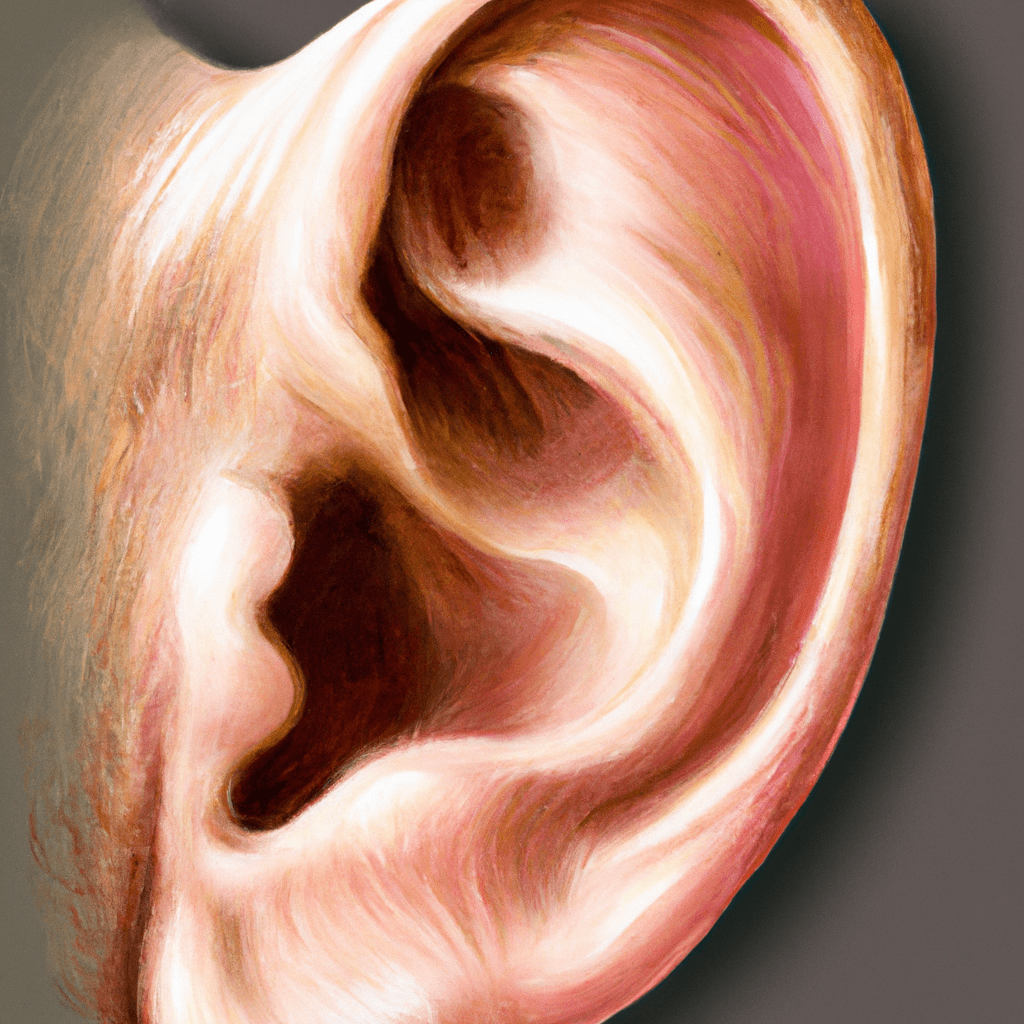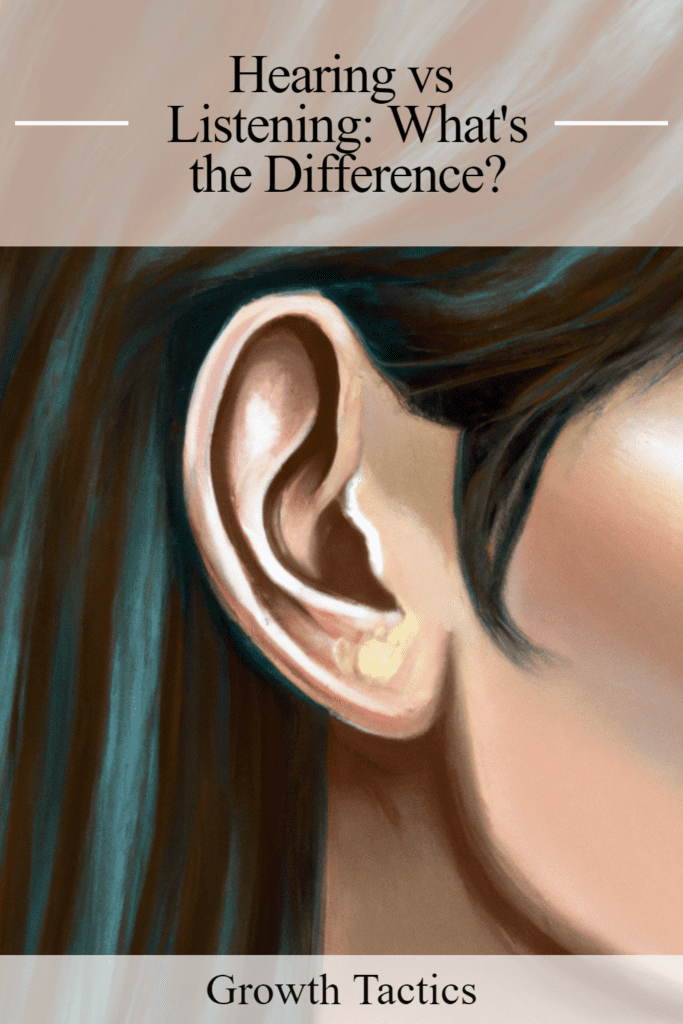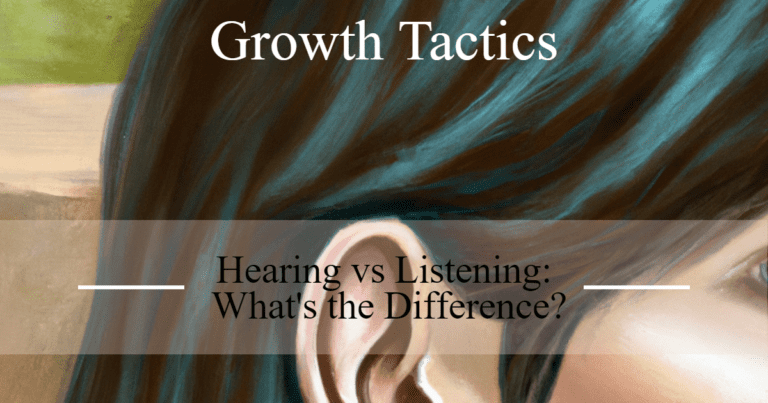Hearing and listening are two closely related activities, yet they have distinct differences. In this article, we will explore the difference between hearing and listening and what it means for our everyday lives. We will look into why it’s important to be mindful of the distinction and how we can hone our listening skills to improve communication with those around us and build stronger relationships.
Jump To Section
What is the Difference Between Hearing and Listening?
Hearing and Listening are two different activities that rely on two different senses.
What it Means to Hear
Hearing is a passive process where sound waves hit your eardrum and are transmitted through your skull to your inner ear. Think about a tv in the background that you aren’t paying attention to. You can still hear it even though you aren’t actively listening to it.
What it Means to Listen
Listening, on the other hand, requires you to actively listen to what is being said for you to understand it. That means taking hearing a step further and processing what is said. This is like attentively watching that tv to understand what is going on.
For you to perceive what someone is saying, you must be able to hear their voice. However, hearing is simply perceiving the sound waves while listening requires you to focus on the sounds being made and take them in as well.
Active and passive listening

Active listening is when you actively engage with the speaker while passive listening is when you simply listen without commenting or asking questions. Both of these methods have their benefits and drawbacks, so it’s important to choose the one that works best for the situation.
Active listening can be helpful if you want to understand the speaker better, but it can also be disruptive if the speaker is talking too fast or if they are difficult to understand.
Passive listening is generally easier and more comfortable, but it can also be less informative if the speaker doesn’t have much to say.
Ultimately, it’s important to find a way to listen that works best for the situation. Whether you’re actively or passively listening, make sure you’re paying close attention to what the other person is saying.
The Importance of Active Listening
Listening is an important skill to have, and one that can be difficult to master. When we are trying to listen actively, we are taking the time to really hear what the other person is saying. This can be difficult, but it is essential in building relationships and understanding.
Too often, we hear only part of what the other person is saying. If we are not actively listening, we risk not hearing what is important and may miss key points or important details. By paying attention to what the other person is saying, we can better understand them and build a better relationship.
Role of Listening in Relationships

Active listening is essential to building healthy, loving relationships based on mutual respect, trust, and emotional intimacy. Where hearing is passive and usually accidental, listening takes a bit more effort and purpose.
In relationships, active listening demonstrates respect and empathy. For example, when a friend shares a concern about their job, simply hearing their words might allow you to nod along. Active listening involves listening with your whole attention and with the intention to validate their emotions.
Or you can ask more open-ended questions, such as, “What do you think would make things better?” This creates a feeling of validation and communicates to them that their experiences are important. With practice, this kind of attentiveness can deepen relationships by fostering an environment where honest dialogue can flourish.
Listening is a key to conflict resolution Listening is a crucial part of conflict resolution. When people spend more time crafting their answer instead of actively listening to what is being said, misunderstandings quickly snowball.
During an argument over chores, for example, stop for a second and really pay attention to what’s bothering your partner. Doing so can help you unearth deeper frustrations, such as a sense of being undervalued. Once both parties feel truly heard, it’s much easier to address these deeper concerns and work together to find a solution that satisfies everyone.
How to Be an Active Listener and Fully Engage in Conversations

Next, we’ll discuss some tips on how to be an active listener so you can build those stronger relationships.
Ask questions
If you are ever feeling lost or confused, the best way to find your way back is by asking questions. This will force you to listen more and it will help you to understand what is happening. Being curious will keep you invested in the conversation.
Don’t assume you understand
When you are trying to understand someone, it is important to be aware of the fact that assumptions can often be mistaken. You should ask for clarification if you don’t understand something. This will help ensure that you understand the person’s message and not just what they are saying.
Look at body language
When you are trying to get someone’s message, it is important to pay attention to their body language. It can tell you a lot about what they are thinking and how they are feeling. Pay attention to the way they are sitting, the way they are moving their arms and legs, and the way they are looking at you. Body language is a huge part of what people say, so it is important to use it correctly to get the information you need.
Be present
People who are better listeners can live in the moment and not become distracted. They also try to keep their focus on the person they are conversing with, instead of looking for things to occupy their time. This allows them to get a deeper understanding of the person they are speaking with.
Get interested in the topic

When it comes to learning, being interested in the topic will help you pay more attention. When you’re interested in what you’re learning, your brain is more likely to focus on the information and also remember it better.
For example, studies have found that students who listened to materials that they were interested in remembered more of the information than those who listened to materials that they were indifferent about. Another study found that people listen more carefully when they are interested in what they are hearing. In short, try to get interested in the topic, and you will be able to learn more effectively.
Slow Down the Communication if you need to
If you need to really listen to someone, you should slow down the communication. If you don’t understand what the other person is saying, you should circle back and try to get a better understanding. Especially if the other person is speaking too fast or using complex words, it can be difficult to follow their conversation. Even if you do slow down, make sure you still communicate effectively by using clear and concise language.
Only Give Advice Only When Asked
When you are asked for advice, try to be selective with what you offer. Not everyone is looking for your input, and sometimes people just want to be heard. Try to provide constructive feedback when it is requested, but avoid giving unsolicited advice.
Eliminate Distractions
It’s so easy to get distracted when we’re trying to listen to someone. We might be thinking about what we’re going to say next or looking at something else in the room. But there’s one way to truly listen: focus all of your attention on the person talking. Don’t let anything else distract you. You’ll be able to hear everything they’re saying better, and you’ll be more likely to remember and comprehend it.
Stop thinking about what you’re going to say
If you want to be a good listener, you need to limit your thoughts and just focus on what the other person is saying. Be present and let them talk without interruption. If you do this, you’ll be able to understand their thoughts, feelings, and concerns much better. And most importantly, you’ll build trust and rapport with the person in front of you.
If you are too busy thinking about what you’re going to say next you will miss parts of the conversation.
Keep an Open Mind

If you want to be an effective communicator, you have to keep an open mind. You have to be willing to listen to others, and not just hear what you want to hear. You have to be willing to compromise, and not take things at face value. And finally, you have to be able to forgive.
Repeat back what the other person says
When someone is talking to us, we must pay attention and repeat back what they say to make sure that we are understanding them correctly. It can be hard to do this sometimes, but by doing this we not only show the other person they are heard but also make sure we clearly received their message.
Practice having empathy
Empathy is a skill that is important in all relationships. It is essential to be able to see the other person’s side to effectively communicate and build relationships. Listening more actively and attentively can help improve empathy skills.
Common Barriers to Effective Listening

Despite our best intentions to actively listen, various distractions can hinder our ability to engage fully. Let’s examine some common barriers to effective listening:
First, there are external distractions. Noise from the surroundings, like traffic or loud conversations, can divert our attention and make it challenging to focus on the speaker.
Internal distractions, such as preoccupying thoughts or stress, can also impede active listening. Moreover, the use of technological devices, like smartphones or laptops, can draw our attention away from the conversation.
To truly listen and understand, it’s crucial to eliminate these distractions and create an environment conducive to active engagement. Find a quiet space, silence your phone, and clear your mind of any thoughts not relevant to the conversation.
By removing these barriers, you can give your undivided attention to the speaker and truly absorb their message.
Did you enjoy this article on the difference between hearing and listening? Please share and subscribe below.


